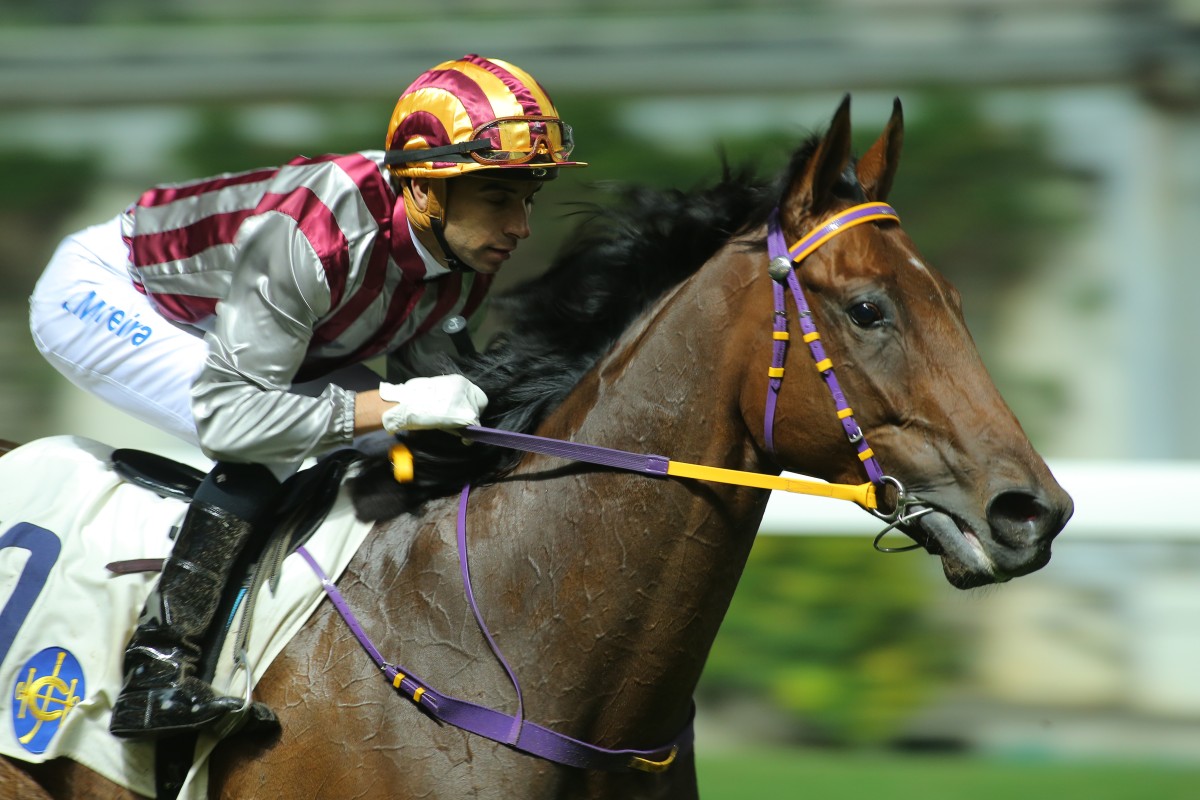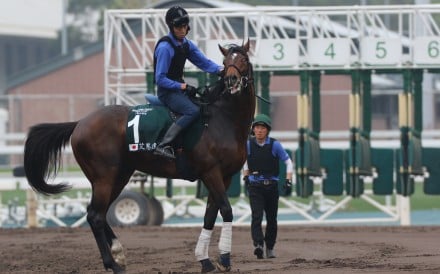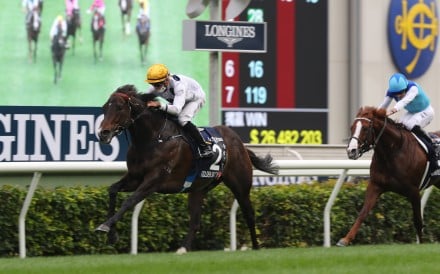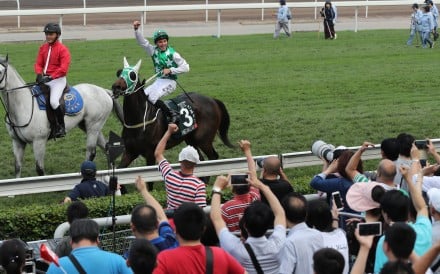BMW Hong Kong Derby placegetter Romantic Touch took a 10-point leap in the ratings after his run-on effort at big odds in Sunday’s classic and the subsequent progress of Benno Yung Tin-pang’s four-year-old will make a fascinating little case study of the relative strength and depth of the Group One.
Romantic Touch came into Sunday’s race rated 90, and finished third at massive odds, a length behind Luger, rated 107. Luger’s rating jumped three points to 110 and as such, the handicappers were forced to adjust accordingly and apply what is the maximum ratings rise applicable to placings two through five of 10 points. The rest were exempt.
Romantic Touch leaps from 90 to triple figures without winning a race or proving that number against all ages in open company – and history shows that jumping half a class can put a horse in the dreaded “no man’s land” – or “no horse’s land”, as it were – of Hong Kong racing.
Now, let’s get a couple of things straight. This isn’t a comment on handicapping or the system, or whether the numbers are right or not – we will leave that to our more learned colleagues – and don’t for a second think the owners of Romantic Touch would swap the HK$1.8 million in prizemoney in return for their 10 points and start again on 90.
 Benno Yung will now have to manage Romantic Touch's programme to fit his high rating.
Benno Yung will now have to manage Romantic Touch's programme to fit his high rating.
They would be thrilled, and so they should be. But in this tightly handicapped environment, and with nowhere else to go, Romantic Touch finds himself in a very different situation than had he finished an unlucky sixth.
The life of a 100-plus rated galloper in Hong Kong can be a tough existence, at least relative to the options of a horse of comparable ability in other jurisdictions.
The fourth or fifth best horses in any specific category – sprint, mile or middle distance – can find himself carrying big weights in the Group Two and Three handicaps, and getting little relief in the set-weight and weight-for-age Group Ones.
Actually, try training any horse rated above 110 whose best trip is anywhere between 1,400m and 2,400m, if their name isn’t Able Friend or Designs On Rome. The Yasuda Kinen starts looking like a drop in grade.
John Moore’s quality horses have had a habit for ending up in this middle ground – he even has a group in the sprint category right now, with Charles The Great (rated 118) Frederick Engels (115) and Flagship Shine (110) all struggling for viable opportunities – and he has already pulled the pin with the out-of-form Sterling City and retired the Group One winner to Australia rather than wait for his rating to drop.
Moore’s Derby fourth-placegetter Helene Happy Star copped seven points and goes from 95 to 102.
John Size’s Derby winner may have gone up to 110 after his dominant victory, but Luger looks to have the necessary upside to go on with it – even if he has to eventually butt heads with Able Friend.
 Luger (Zac Purton) wins the Hong Kong Derby, with Romantic Touch (Tye Angland) making ground along the inside into third.
Luger (Zac Purton) wins the Hong Kong Derby, with Romantic Touch (Tye Angland) making ground along the inside into third.
In 2012, Size-trained Derby winner Fay Fay had already made the obligatory double figure jump when second in to Sweet Orange in that year’s Classic Mile – he was already rated 110 and went up another three pounds to 113 after the big one.
Fay Fay didn’t win again – well, at least not for Size in Hong Kong – a switch to the New Zealand stables of Trevor and Martin Cruz, sons of Hong Kong trainer Derek, produced a first-up victory in the Group Three Tauranga Stakes after a 17-month break. Maybe a wet track helped – something that just doesn’t happen at Sha Tin – but Fay Fay was simply not quite good enough to win off his age-group attained rating. Fay Fay was smack bang in the middle of “no horse’s land”.
In 12 more unplaced runs for Size it wasn’t as if Fay Fay raced badly, his rating actually rising to 116 late in the 12-race stretch. And it wasn’t as if the 2012 Derby lacked quality either – among the unplaced brigade were subsequent Group One winners Dan Excel, Military Attack, Dominant and Liberator.
There are other cautionary tales of non-winners getting slugged by the handicappers and simply not coping, and sometimes it comes from an ill-advised risk to throw a horse in over its ratings head – at least Yung had a crack at what he purchased the horse for, and came up with a decent cheque.
The season after Fay Fay’s triumph, German galloper Autumn Gold arrived with Sean Woods rated 88. After a promising first-up run, Woods rolled the dice and entered in the Group Two Jockey Club Mile. A fifth to the then 126-rated California Memory in receipt of eight pounds meant Autumn Gold jumped to 100, a mark at which he struggled. It took to the tail end of the following season, and a drop of 20 points into Class Three, to win again.
Then there is Tony Cruz-trained sprinter Thunder. This import jumped 20 points, from 95 to 115, with two consecutive fourth-placed finishes at the top level. Three unplaced runs later, he was gone.
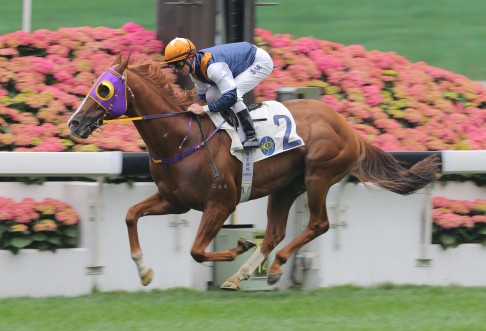 Numero Uno received a large rating hike for Yung after winning a Class Four handicap easily on Derby day 2014.
Numero Uno received a large rating hike for Yung after winning a Class Four handicap easily on Derby day 2014.
Something in Romantic Touch’s favour: he finds himself on a nice even number, 100, with options all around – he can stick to both Class One and Two, with a host of mixed-band ratings races, or Group events where he can carry light weights.
But Yung already knows a thing or two about how a big ratings hike can affect a horse’s immediate future.
Last season – on Derby day, in fact – Numero Uno cantered away with a Class Four handicap by four and a quarter lengths. After the race Yung pleaded with the handicappers through the media not to crucify his horse in the ratings. Numero Uno had been gifted the race through a low draw and favourable tempo against a weak field, Yung argued post race.
“Yeah, but that’s what they all say,” I hear you say, dear cynical reader.
Since then, Numero Uno has run well but hasn’t been able to win. And every time Benno has had an impressive winner since, he might as well be pleading with the handicappers in his post-race press conference: “Please don’t Numero Uno me.”
